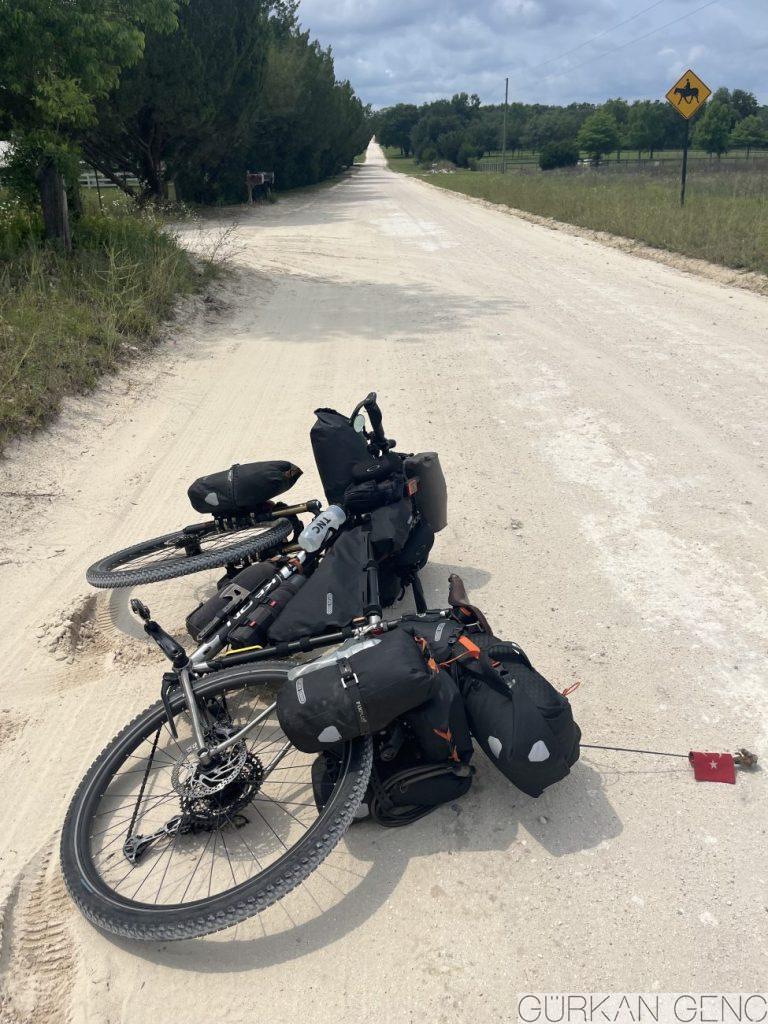 I had to spend a few days in Orlando dealing with my bike. Back in Colombia, I had replaced my rims with a slightly narrower, lighter, and stronger model. However, the spokes used there turned out to be terrible. I kept breaking spokes on my way to Orlando and even beyond. Since I had been using the same rims for years, the best quality ones, I was not used to having this issue. It was a surprise for me. By the time I reached Orlando, I had broken 8 out of the 32 spokes on my rear wheel.
I had to spend a few days in Orlando dealing with my bike. Back in Colombia, I had replaced my rims with a slightly narrower, lighter, and stronger model. However, the spokes used there turned out to be terrible. I kept breaking spokes on my way to Orlando and even beyond. Since I had been using the same rims for years, the best quality ones, I was not used to having this issue. It was a surprise for me. By the time I reached Orlando, I had broken 8 out of the 32 spokes on my rear wheel.
I realized the situation while staying at İsmail’s house and was amazed that I had even made it that far with my wheel in that condition. This also showed me just how strong the rim itself was. Anyway, I’ll get it fixed. I still have some work to do with G1.
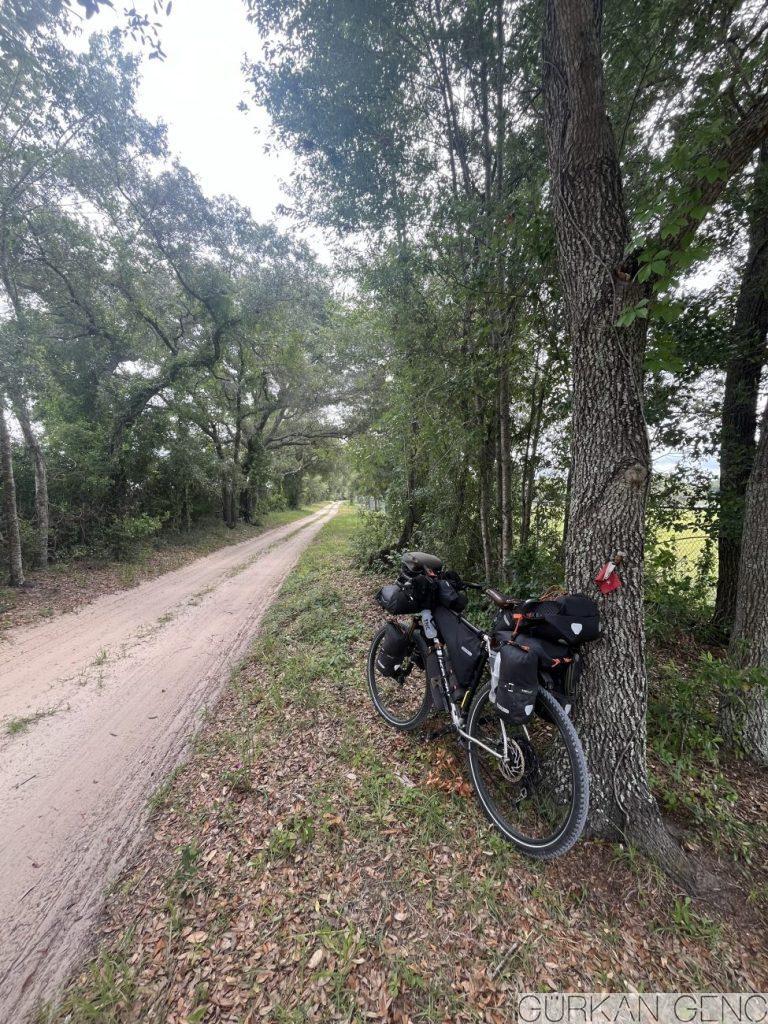
Years ago, I wrote about some of the apps I use on my tours on my website. One of them is WarmShowers, a platform exclusively for cyclists. I still use it, and it’s quite active in the U.S. Many other cyclists rely on it too. For the past three years, I’ve become a subscriber. I also mentioned an app called iOverlander before. They’ve updated it, and I subscribed for that as well. Then there’s Strava, widely used by cyclists, I’ve been a subscriber for years.
Why do I pay for these apps? Because developers, designers, and the people behind them put in time and effort to create something valuable. Since I actively use these services, I believe it’s only fair to support their work. It’s simply the ethical thing to do.
WarmShowers, in particular, works very well in this country. About 80% of the users I message respond.
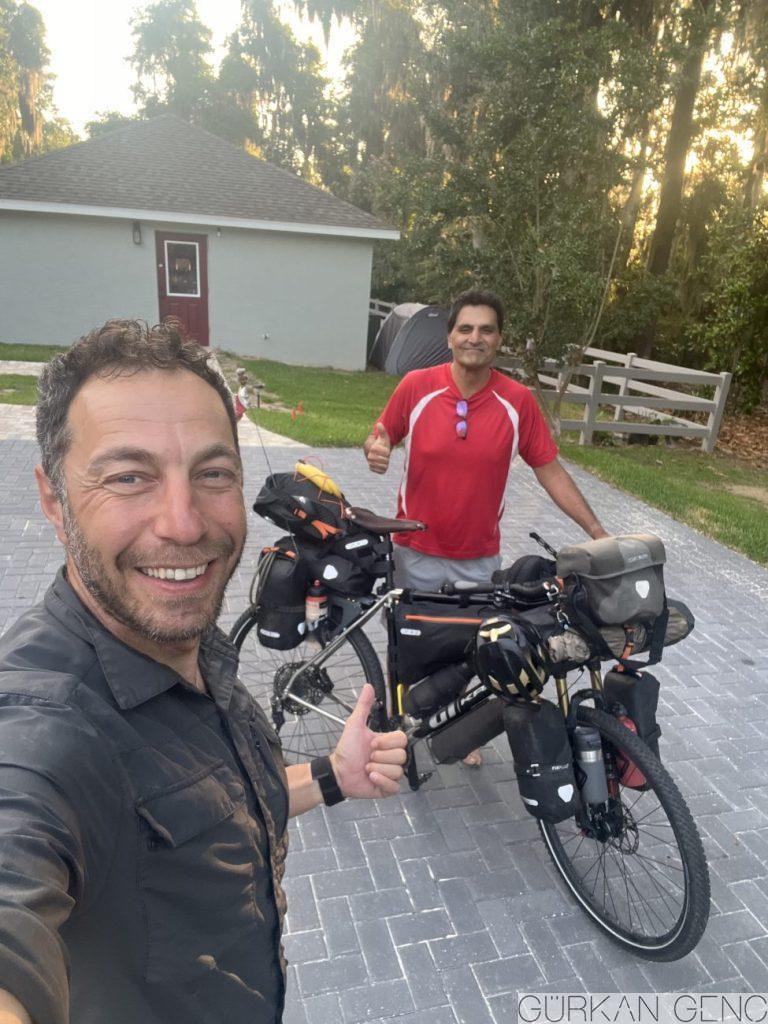
After leaving Orlando, I stayed with Rahul, a WarmShowers host in Ocala. Originally from Kashmir, Rahul works as a software developer in the United States. He welcomed me into a separate guesthouse on his property—larger than the summer house we used to own in Bodrum.
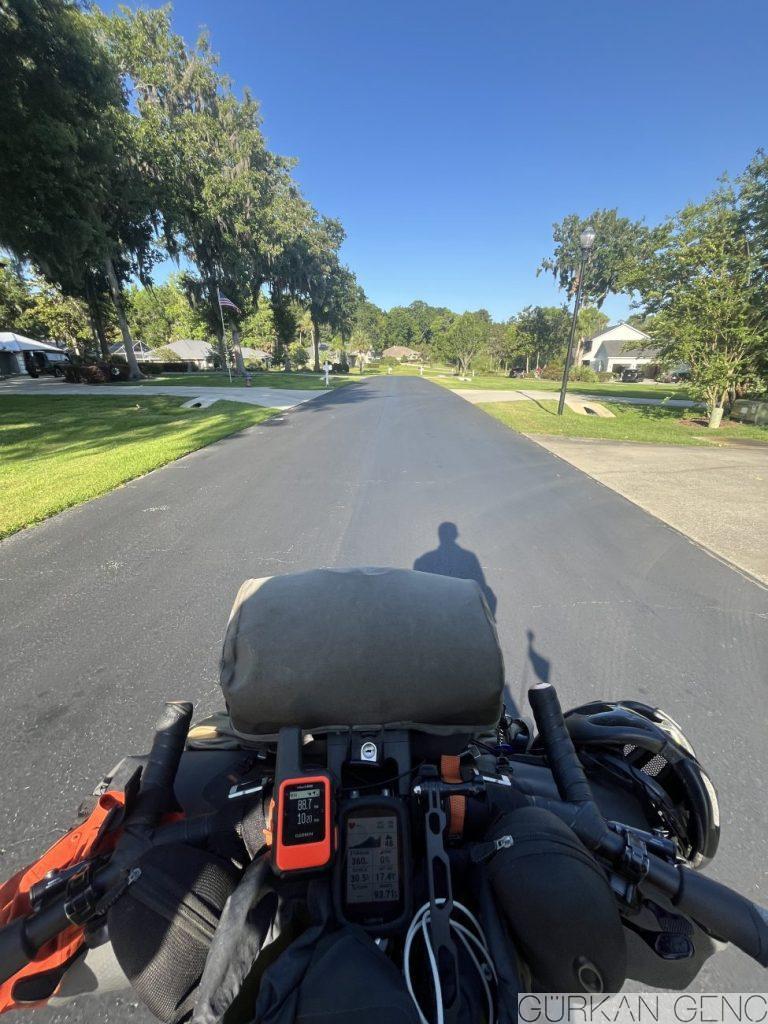
Rahul had done some short tours along the West Coast with his friends. Over a delicious dinner, we talked about his experiences, his views on his home country and the world, and the challenges he believes American society will face in the future. I had a great night’s sleep before continuing my journey the next day.
His home was in one of the most luxurious residential communities I’ve ever entered. Peacocks, deer, and squirrels roamed freely, and I spotted several bird species. There’s no doubt in my mind, that country truly rewards those who work hard.
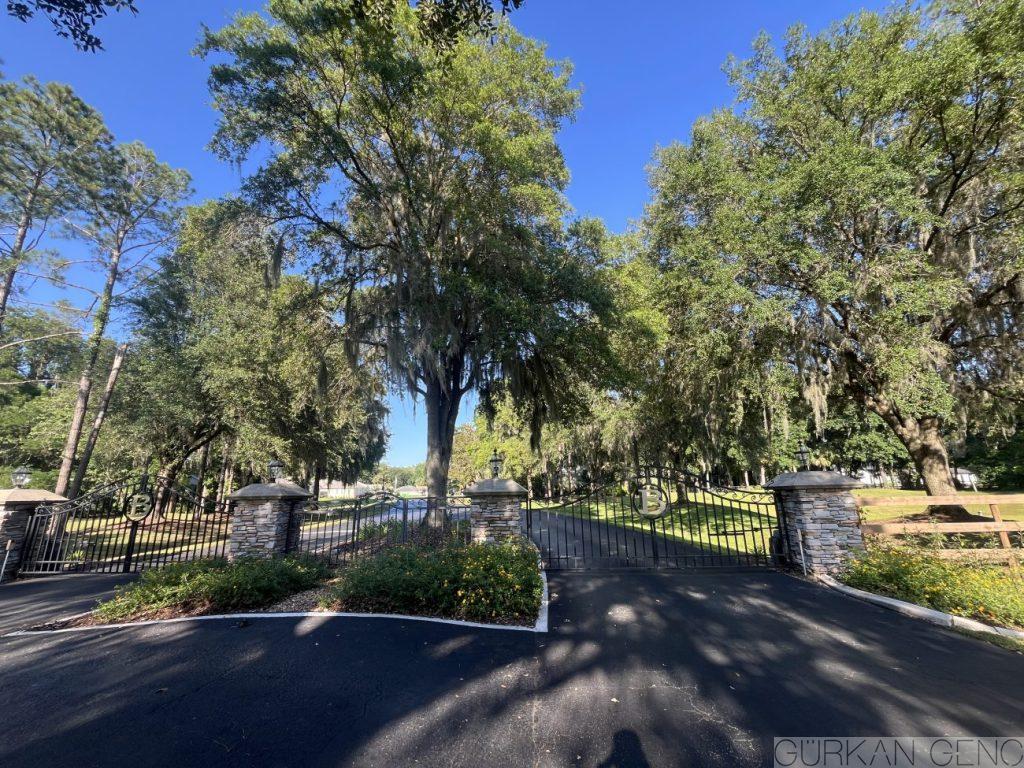
Next on my route was Gainesville. Honestly, I hadn’t even heard of this city before. I later found out it’s home to the University of Florida.
Months earlier, Ziynet and Doruk had invited me to visit. By the time I arrived, Doruk had already returned to Türkiye, but Ziynet was still there and had messaged me, insisting I come. As I neared the city, another message popped up.
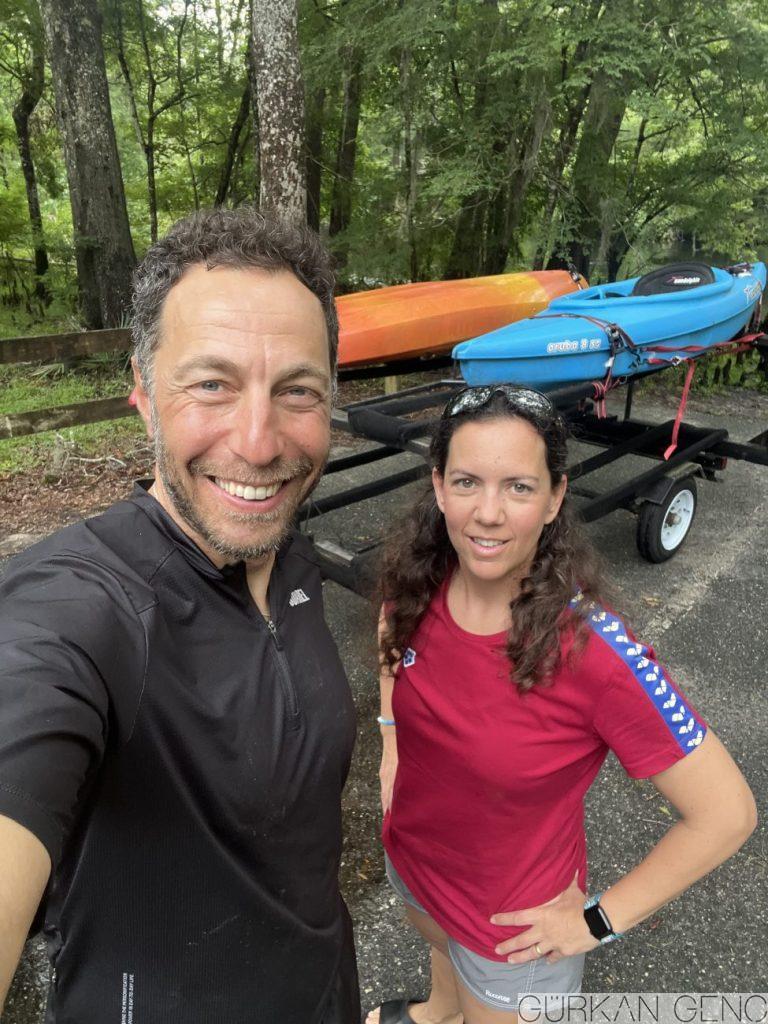
It was from Yasemin Dalkılıç.
At first, I thought someone was playing a prank on me. But after a quick search, I confirmed the account was hers.
Younger generations might not be familiar with her, but those interested in diving surely know her name. In the late ’90s and early 2000s, Yasemin Dalkılıç was a legendary Turkish freediver, breaking records and earning the admiration of Turkiye.
Then, while I was cycling one day, my friend Cem Demirci called me…
– “Dude, what’s up? When am I coming to the U.S. to cycle with you? Give me a date already, I need to check flights!”
– “Cem, there’s still time for that, relax. But hey, guess what? Yasemin Dalkılıç just messaged me, she’s living in one of the cities ahead, in Gainesville.”
– “Oh yeah, I’ve heard of that city, but I don’t know much about it. Yasemin was on the swimming team at Yükseliş Koleji (my high school), she was a senior. Don’t you remember?”
– “Nope, Cem. My memory wasn’t that sharp back then.”

Turns out Yasemin and I used to train in the same pool. And now, here was a message from her sitting in my inbox:
“Gürkan, welcome to the United States! I’ve been following your journey with great admiration. I have so many questions for you. If Gainesville is on your route, we’d be happy to host you at our home.”
I read it twice, smiling. The people I meet on this journey never cease to amaze me.
I adjusted my Gainesville plans, since Yasemin and her husband Rudi’s house was on the way before Ziynet and Doruk’s, I decided to stop by first. She had many questions for me, but I was just as curious about her life. What had she been up to? And why was she living in the middle of Florida, far from the ocean?
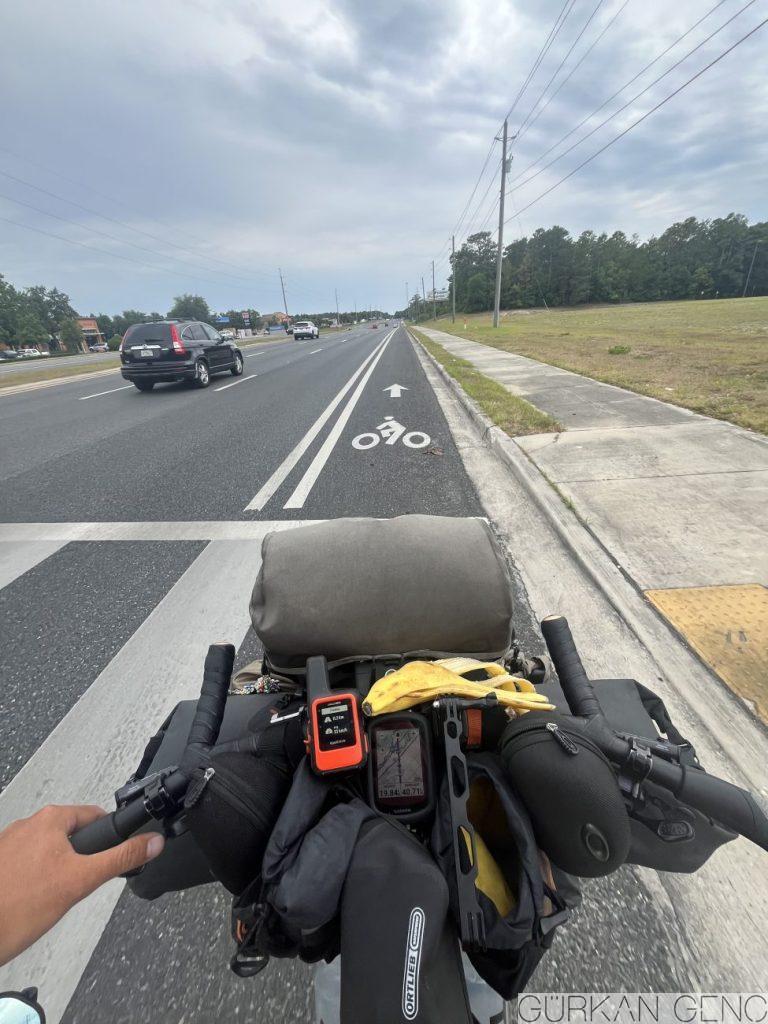
From Miami to Gainesville, there are dedicated bike routes. Even when there aren’t official signs, the roads are safe for cycling. At one point, I came across a state park that required a $2 entry fee for hikers and cyclists. I figured if someone asked, I’d pay. But even though I camped there overnight, no one ever came to check.
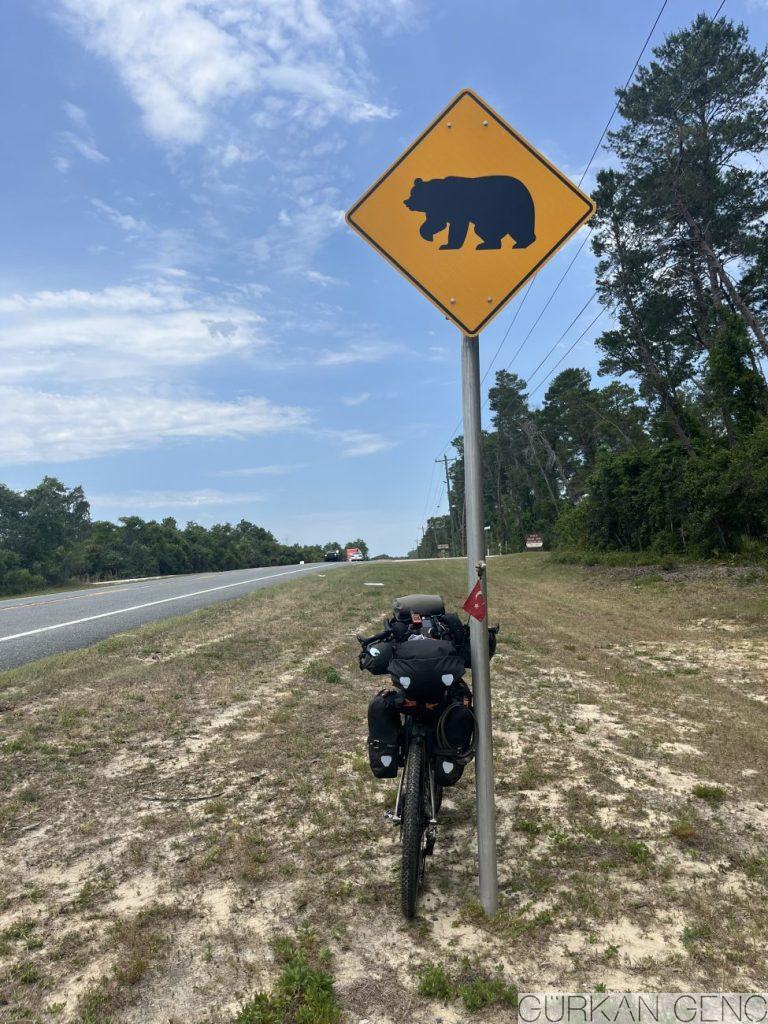
Just before reaching Yasemin’s house, I had another unexpected moment, seeing a “Bear Crossing” sign. Wait, what? I didn’t expect to see this warning so soon. I thought bears were much farther north. When I asked locals, they confirmed: there are two adult bears and four cubs living in the area.
That night, setting up my tent meant one thing, dinner was off the table. Not only that but no food or fruit could be left outside. The only exception was canned food; everything else had to be eaten before setting up camp.
I had written about this on my website before, but when I shared it on social media again, I realized many people didn’t know this trick. When camping in areas with wild animals, I always mark a semi-circle around the entrance of my tent by urinating. Since male urine contains a small amount of testosterone, it acts as a territorial marker. Predators, highly sensitive to scents, recognize it and typically won’t cross the line. I’ve been doing this for years, and from the tracks I’ve seen, animals never step beyond the marked area. That’s why, whenever I camp in such areas, I always make sure to “mark my territory.”
– “So, Gürkan, what are we women supposed to do?”
– “Simple, bring a male companion as a tool.”
The Road Through Old Trails
All along my route, nearly every farmhouse had Trump supporter signs out front.
I continued cycling on paths once opened by Spanish explorers, state parks, cattle ranches, and endless roads where not a single car passed. It was perfect.
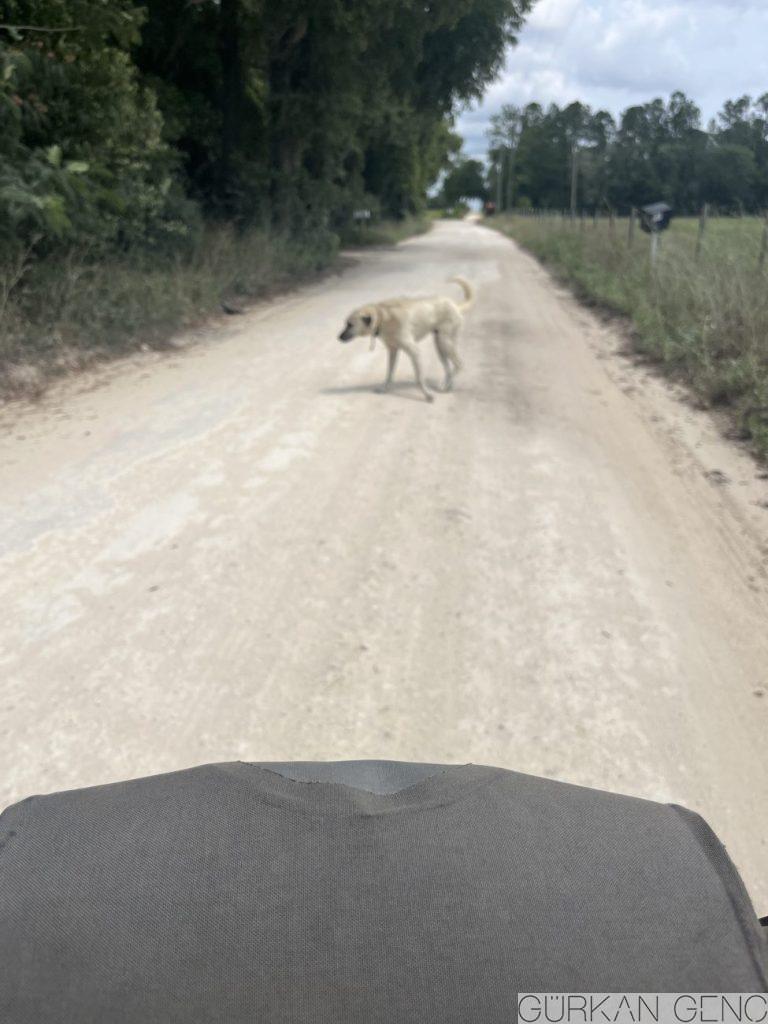
Then, on one of these deserted roads, something unusual happened. A massive dog came charging straight at me.
And not just any dog, an Anatolian Sheperd!
Barking like crazy.
– “Hey, you idiot! We’re countrymen, get a grip! Stop barking!”
Somehow, talking to him worked, and I rode past without a problem.
This isn’t a common situation. If that dog had attacked and injured me, I could have sued the owner for a significant amount of money. That’s why nobody leaves their dogs loose around here, it could cost them a fortune.
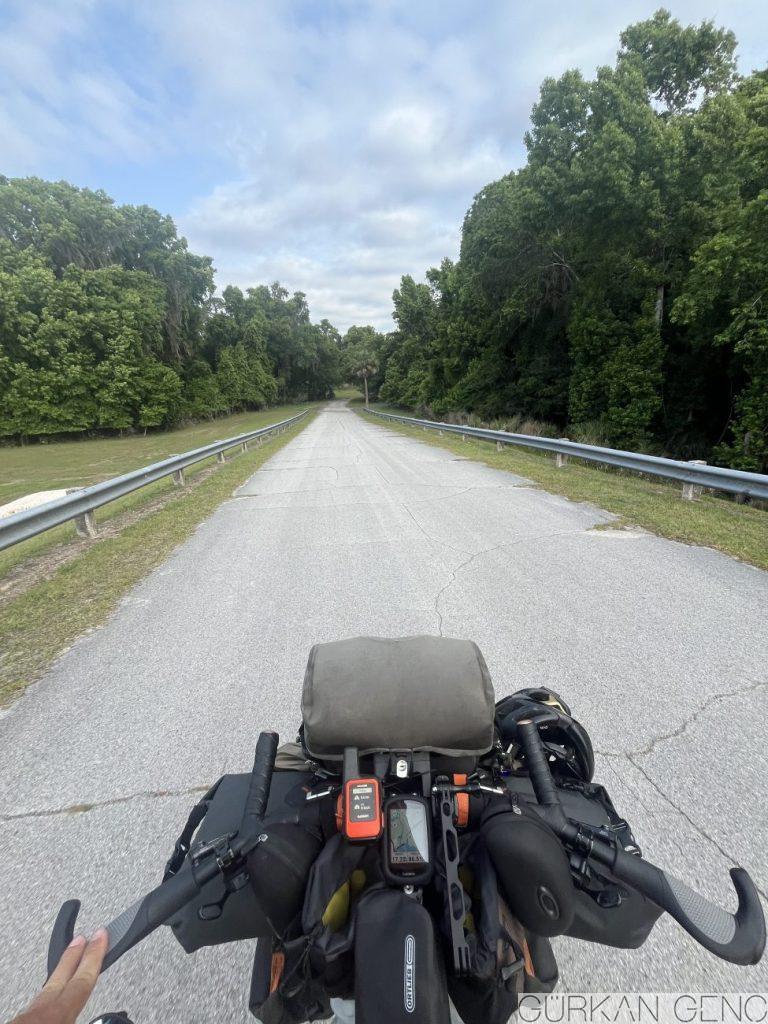
Reaching Yasemin and Rudi’s house in Gainesville was surprisingly easy. As I mentioned, the bike lane network here is excellent and well-designed. If I had to describe her home, I’d say it’s a true wilderness retreat, tucked away in a dense, untouched forest.
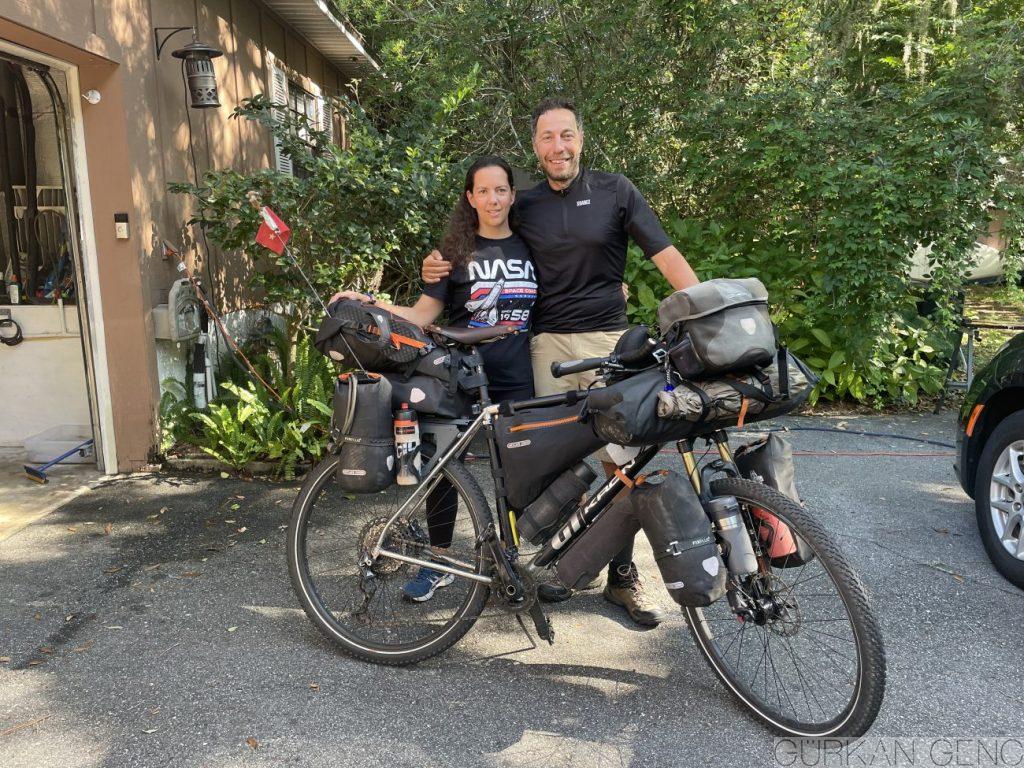
From the moment we met, it felt like we had known each other forever, two old friends catching up after years apart.
Back in the late ‘90s and early 2000s, I followed her record-breaking dives through newspapers and TV broadcasts. We didn’t have today’s social media, where updates are just a click away. Now, as I travel the world, I can see everything she shares instantly. But back then, Yasemin suddenly disappeared from the public eye.
I always say this during my live broadcasts: people like us, adventurers, and athletes, are followed by those who share the same passion. You might stumble upon our stories occasionally, or you follow us because you’re genuinely interested in what we do. Diving, freediving, and swimming weren’t my areas of interest. So when Yasemin vanished from the spotlight, I never questioned it. She had already made her mark in history, and that was enough to make us proud. The rest didn’t concern me.
I never knew why she left Türkiye, nor did I know the full story behind her diving career. That night, I finally heard it all from her. As she spoke, she would pause now and then, lost in thought. At that moment, I understood she was reliving her past. In those few seconds of silence, the struggle that had lasted for months, perhaps even years, was flashing before her eyes. Her eyes welled up as she recounted her journey. It was clear that things hadn’t always gone as planned, that something had gone wrong. And in that moment, I began to understand why she had left everything behind and built a new life here with Rudi.
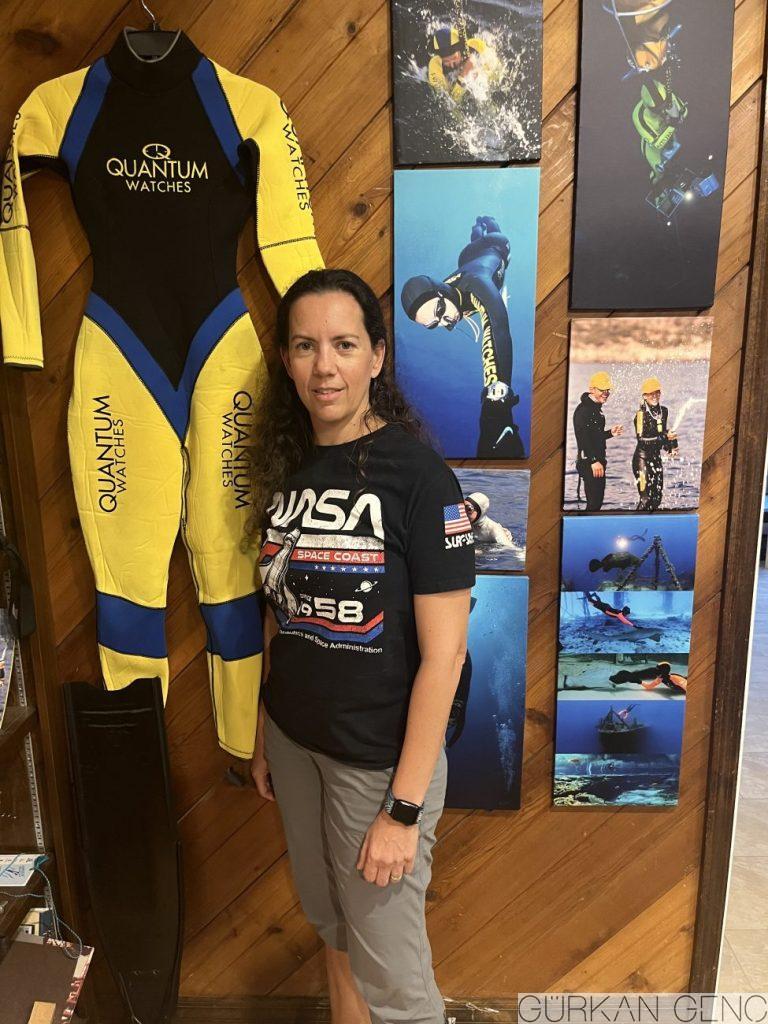
“Gürkan, how do you deal with people? How do you handle negative comments and the things written about you?”
Perhaps someone reading this, someone who speaks to an audience, can relate.
I never imagined I’d reach this point. I had no idea what it would be like. Yasemin didn’t either. When you become a public figure, and share your life with the world, you must also brace yourself for the backlash. Neither of us was truly prepared for that. That’s why I understand her teary eyes so well.
I ignore or avoid responding to 90% of negative comments. No one taught me how to do this. I don’t have a manager or a mentor.
Over the time, I realized that no matter what I say, someone will misunderstand, twist it, or take offense. There will always be those who don’t want you to succeed—who will go out of their way to highlight your flaws and attack you in public. And like a fool, I used to try to correct them.
What I share makes some people happy, but it will inevitably upset others. When I acknowledge my own achievements, when I take pride in what I’ve done, I’m labeled arrogant, annoying, or lacking humility.
But here’s the thing, those who voice their criticism directly to my face are almost nonexistent. The ones who do are vastly outnumbered by those who respect and support me. Most criticism comes from anonymous names, fake accounts, and hidden profiles. And that, in itself, speaks volumes. They lack the courage to confront me in person. Because deep down, they know what I have accomplished. When they compare it to their own lives, they realize the real disappointment isn’t me, it’s their lack of action.
Once I understood this, I stopped trying to please everyone. Now, I respond to negativity only on my terms, in my own space. This is my domain, my platform, my turf.
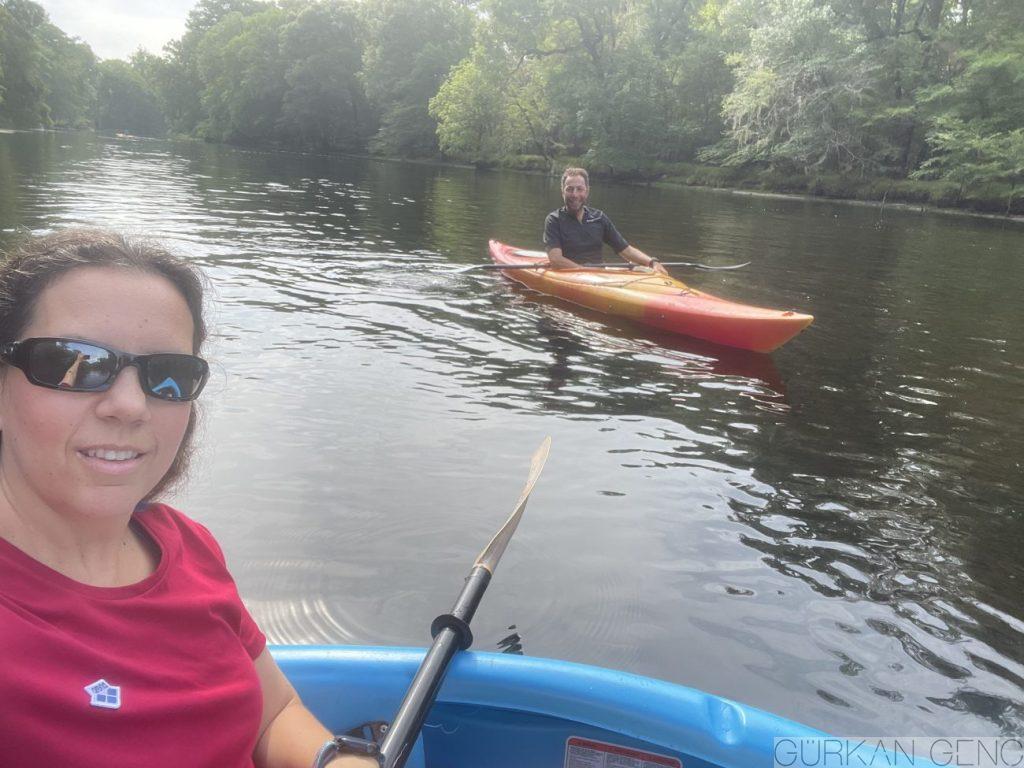
As I spent more time with Yasemin, I discovered she wasn’t just a record-breaking freediver, she was also a talented craftswoman, a skilled guitarist, a gifted writer, and, most importantly, an incredible mother. She and Rudi had raised their children beautifully. Their home even had a small museum-like corner, and right in the spotlight was that iconic yellow swimsuit.
Yasemin and Rudi’s lives have always revolved around water. The main reason they chose this location was its perfect position—just an hour from the Atlantic Ocean to the east and the Gulf of Mexico to the west. The area was also surrounded by natural springs, two of which we visited. Ziynet even joined us for one of the trips.
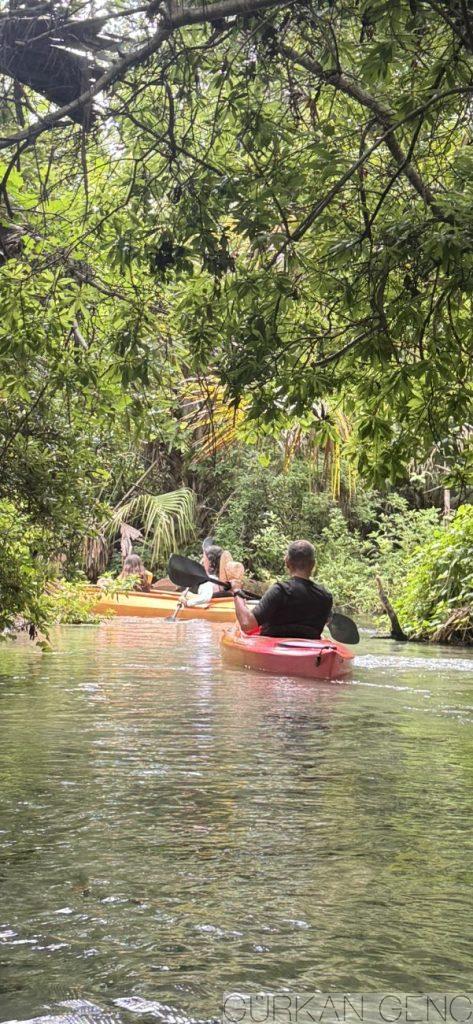
We paddled through the springs in our canoes, with them leading and me following behind. As they passed a sunbathing alligator on their right, they didn’t even notice it.
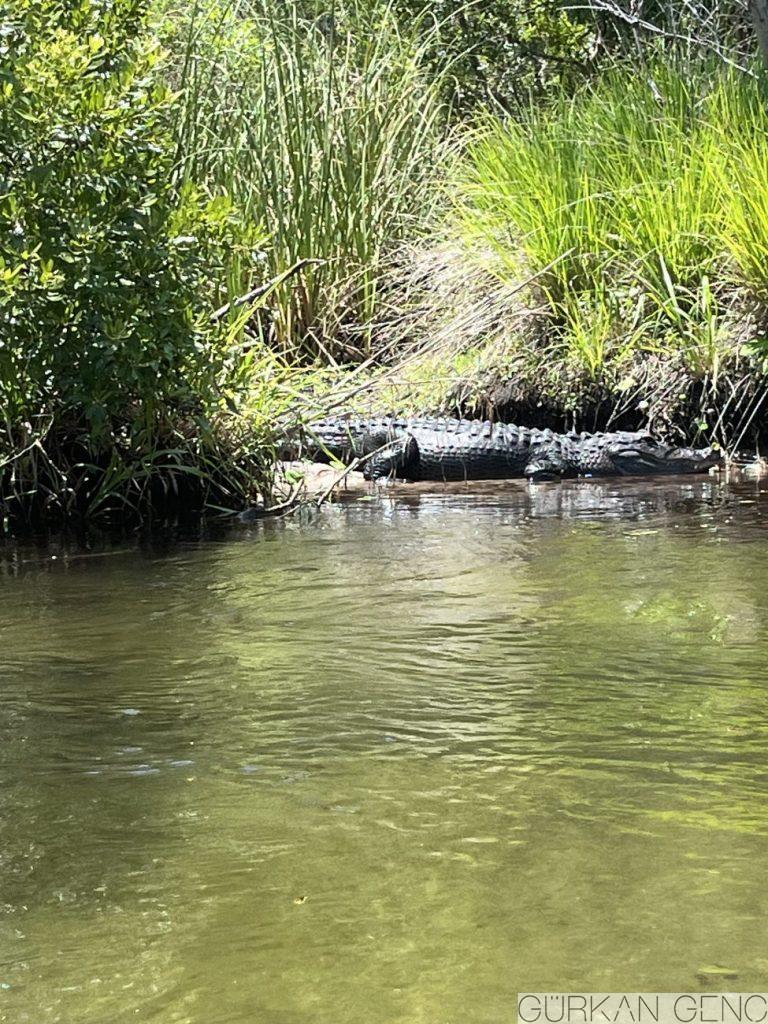
Having cycled solo across Africa for years, I’ve developed instincts for spotting wildlife. Knowing this area had alligators, my eyes naturally scanned from side to side like a built-in sonar. That’s when I spotted it, perfectly camouflaged. But by the time I saw it, they had already passed. It was better to tell them afterward; I didn’t want them to panic. Once everyone was at a safe distance, I managed to snap a photo of it.
The days with Yasemin and Rudi flew by. I’m so glad she reached out, it allowed me to know her in a whole new way. A big thank you, Yasemin!
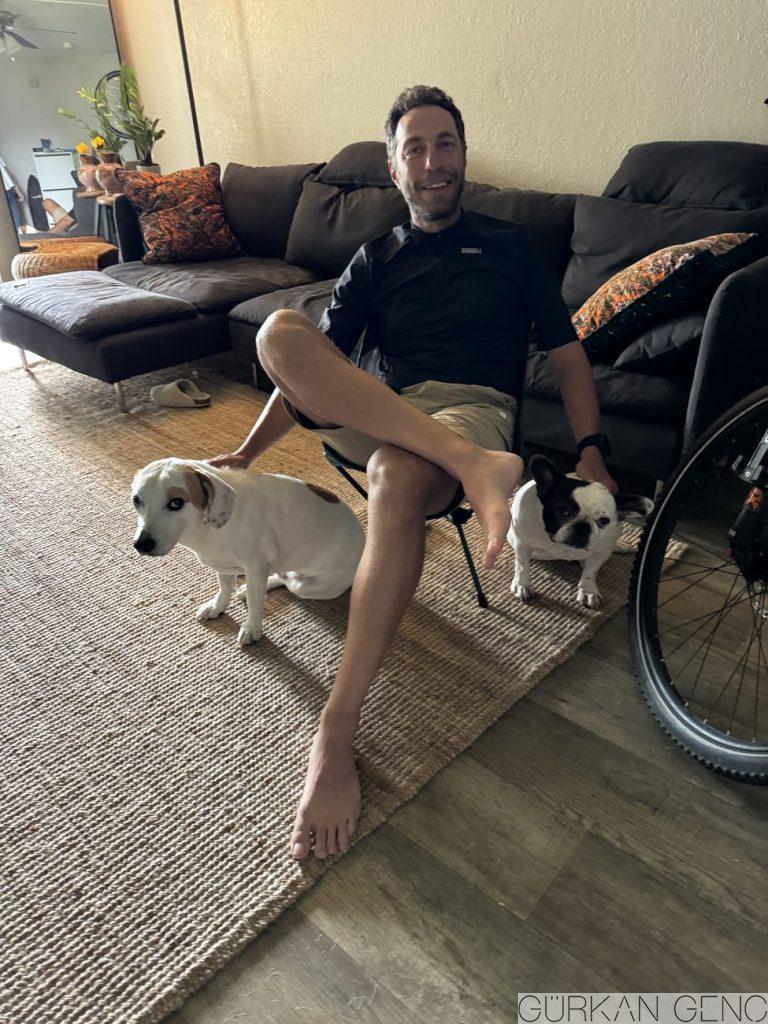
From there, I made my way to Ziynet and Doruk’s home. Unfortunately, Doruk wasn’t there—he had already returned to Türkiye. Ziynet and I had never met before, but she knew of me from years ago through our professor, Nüzhet Türker. A graduate of Mersin University’s Food Engineering program, Ziynet now works as a faculty member at the University of Florida.
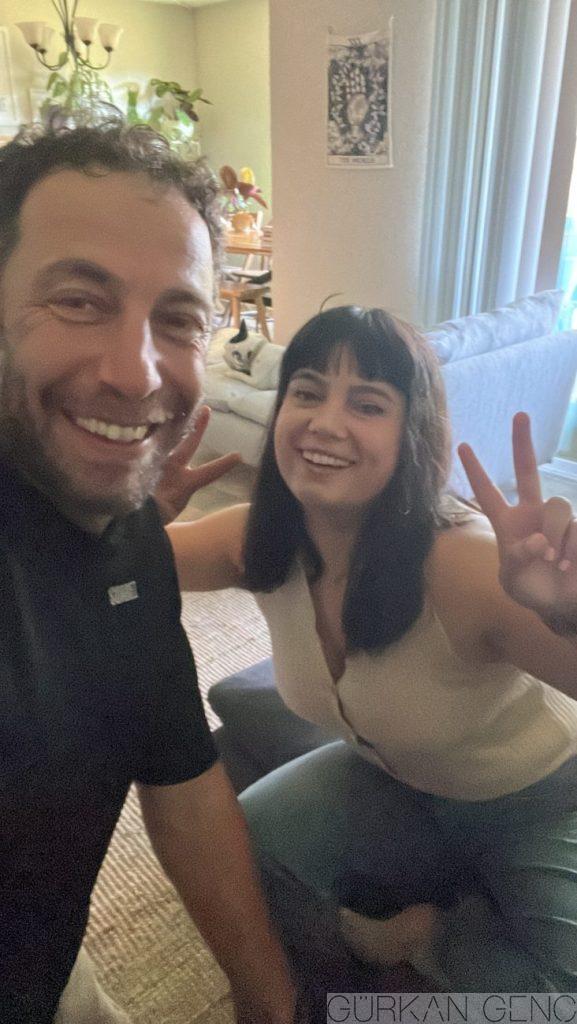
Thanks to Ziynet, I got to explore the city during her free time. She introduced me to her friends and gave me new ideas for my travels, especially encouraging me to create podcasts. She was always talking about microphones. Eventually, I bought one. I can even record while cycling, which is really convenient. I recorded a few podcasts while on my bike but eventually stopped. Talking while cycling didn’t suit me; I enjoyed just looking around in silence instead. Maybe I’ll try again sometime, but for now, I’ll keep going as I am.
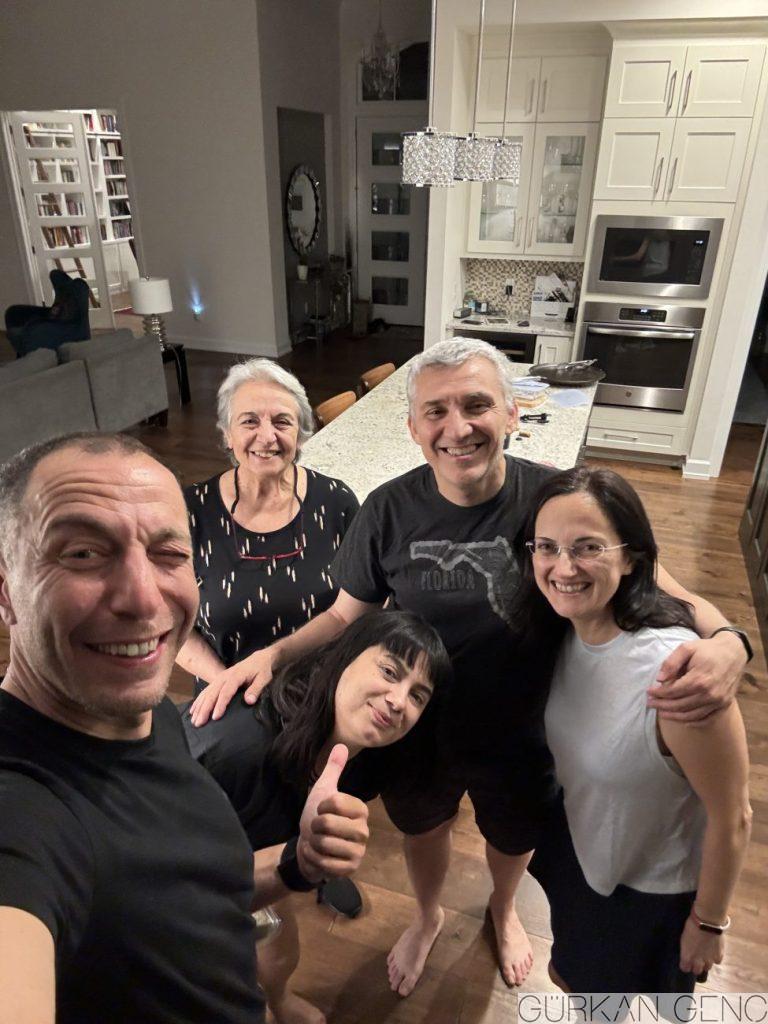
Thanks to Ziynet, Serdar, and Aslı Hoca, who work at the same university, invited me for dinner one day. It turned into a lovely family meal. We mostly discussed the political landscapes and lifestyles of Türkiye and the United States.
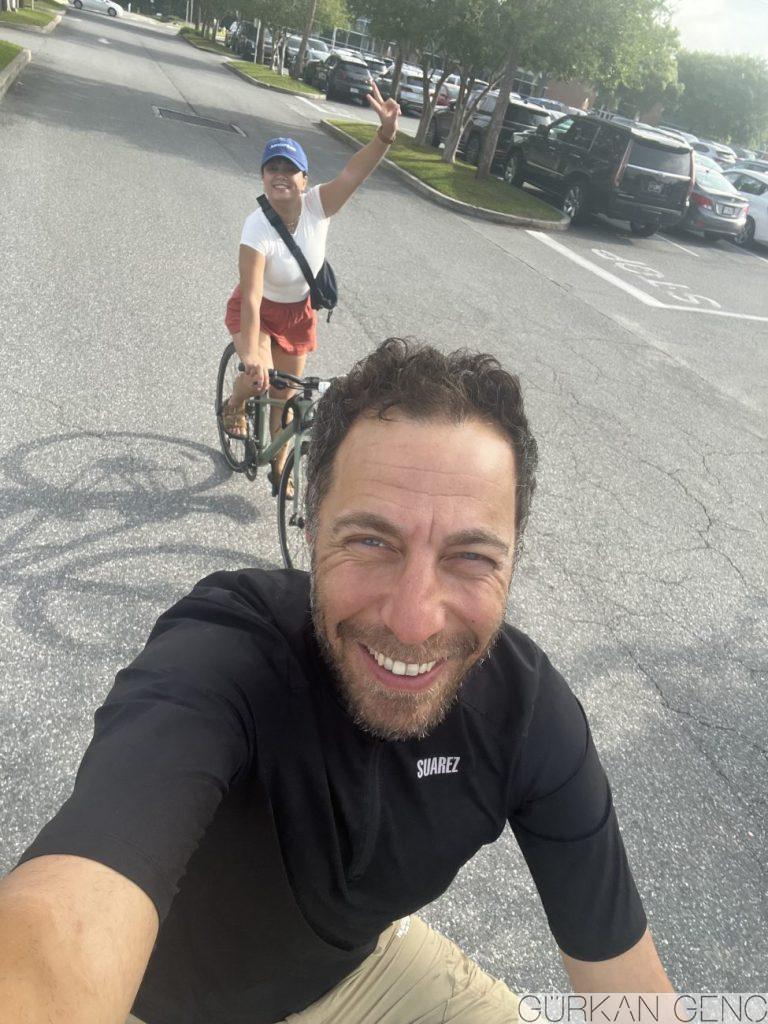
I owe another thanks to Ziynet, as through her, I got to know and experience Gainesville. It became my favorite city in Florida. It’s quiet, peaceful, and incredibly convenient to get anywhere.
I uploaded these posts to my website a little late. Throughout my trip to the US, I kept in touch with Ziynet and Yasemin, continuing our chats over WhatsApp whenever we had the chance.